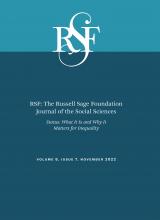Research Article
Open Access
“But the Fellows Are Simply Diversity Hires!” How Organizational Contexts Influence Status Beliefs
Sandra Portocarrero, James T. Carter
RSF: The Russell Sage Foundation Journal of the Social Sciences November 2022, 8 (7) 172-191; DOI: https://doi.org/10.7758/RSF.2022.8.7.09
Sandra Portocarrero
aPostdoctoral scholar at Columbia Business School, United States
James T. Carter
bPh.D. candidate in Management at Columbia Business School, United States

REFERENCES
- ↵
- Amis, John M.,
- Kamal A. Munir,
- Thomas B. Lawrence,
- Paul Hirsch, and
- Anita McGahan
- ↵
- Bendersky, Corinne, and
- Jieun Pai
- ↵
- ↵
- Berger, Joseph, M.
- Hamit Fişek,
- Robert. Z. Norman, and
- Morris Zelditch Jr.
- ↵
- Berger, Joseph,
- Susan J. Rosenholtz, and
- Morris Zelditch Jr.
- ↵
- Bianchi, Alison J.,
- Soong Moon Kang, and
- Daniel Stewart
- ↵
- Blau, Peter Michael,
- Judith Lewis Herman,
- Melinda Blau, and
- Richard A. Schoenherr
- ↵
- Boykin, Malik,
- N. Derek Brown,
- James T. Carter,
- Kristen Dukes,
- Dorriane J. Green,
- Timothy Harrison,
- Michelle Hebl, et al.
- ↵
- Bunderson, J. Stuart
- ↵
- Carter, James T., and
- Rebecca Ponce de Leon
- ↵
- ↵
- Chung, Julie
- ↵
- Coate, Stephen, and
- Glenn C. Loury
- ↵
- Correll, Shelly J., and
- Cecilia L. Ridgeway
- ↵
- ↵
- Cuddy, Amy J. C.,
- Susan T. Fiske, and
- Peter Glick
- ↵
- Dacin, M. Tina,
- Kamal Munir, and
- Paul Tracey
- ↵
- DeRue, D. Scott, and
- Susan J. Ashford
- ↵
- Destin, Mesmin,
- Régine Debrosse,
- Michelle Rheinschmidt-Same, and
- Jennifer A. Richeson
- ↵
- Eisenhardt, Kathleen M
- ↵
- Escrogima, Ana,
- Lia Miller, and
- Christina Tilghman
- ↵
- Fiske, Susan T., and
- Xuechunzi Bai
- ↵
- Galinsky, Adam. D.,
- Joe C. Magee,
- Deborah H. Gruenfeld,
- Jennifer A. Whitson, and
- Katie A. Liljenquist
- ↵
- Germano, Adriana L.,
- Sianna A. Ziegler,
- Laura Banham, and
- Sapna Cheryan
- ↵
- Gould, Stephen Jay
- ↵
- ↵
- Handcock, Mark S., and
- Krista J. Gile
- ↵
- Heilman, Madeline E.,
- Caryn J. Block, and
- Jonathan A. Lucas
- ↵
- Heilman, Madeline E.,
- Caryn J. Block, and
- Peter Stathatos
- ↵
- Hollander, E. P
- ↵
- Kelly, Anita E., and
- Kevin J. McKillop
- ↵
- Koenig, Biko
- ↵
- Kralev, Nicholas
- ↵
- Lamont, Michèle,
- Graziella Moraes Silva,
- Jessica Welburn,
- Joshua Guetzkow,
- Nissim Mizrachi,
- Hanna Herzog, and
- Elisa Reis
- ↵
- Magee, Joe C., and
- Adam D. Galinsky
- ↵
- Martin, Sean R., and
- Stéphane Côté
- ↵
- Martin, Sean R., and
- Spencer Harrison
- ↵
- Melamed, David,
- Christopher W. Munn,
- Leanne Barry,
- Bradley Montgomery, and
- Oneya F. Okuwobi
- ↵
- Mendelberg, Tali
- ↵
- Nag, Rajiv,
- Kevin G. Corley, and
- Dennis A. Gioia
- ↵
- Owens, David A., and
- Robert I. Sutton
- ↵
- Piazza, Alessandro, and
- Fabrizio Castellucci
- ↵
- Pickering Fellowship
- ↵
- Podolny, Joel M
- ↵
- Portocarrero, Sandra
- ↵
- Portocarrero, Sandra, and
- James T. Carter
- ↵
- ↵
- Resendez, Miriam G
- ↵
- Ridgeway, Cecilia L
- ↵
- ↵
- Ridgeway, Cecilia. L.,
- Kristen Backor,
- Yan E. Li,
- Justine E. Tinkler, and
- Kristan G. Erickson
- ↵
- Ridgeway, Cecilia L.,
- Elizabeth H. Boyle,
- Kathy J. Kuipers, and
- Dawn T. Robinson
- ↵
- Ridgeway, Cecilia L., and
- Shelley J. Correll
- ↵
- ↵
- Ridgeway, Cecilia L., and
- Hazel Rose Markus
- ↵
- Ridgeway, Cecilia L., and
- Henry A. Walker
- ↵
- Rivera, Lauren A
- ↵
- Roscigno, Vincent J
- ↵
- ↵
- Scott, W. Richard, and
- Gerald F. Davis
- ↵
- Sutton, Robert I., and
- Andrew Hargadon
- ↵
- U.S. Department of State
- ↵
- Valentino, Laura
- ↵
- Weber, Max
- ↵
- Windscheid, Leon,
- Lynn Bowes-Sperry,
- Deborah Kidder,
- Ho Kwan Cheung,
- Michèle Morner, and
- Filip Lievens
- ↵
- Yoshino, Kenji
In this issue
“But the Fellows Are Simply Diversity Hires!” How Organizational Contexts Influence Status Beliefs
Sandra Portocarrero, James T. Carter
RSF: The Russell Sage Foundation Journal of the Social Sciences Nov 2022, 8 (7) 172-191; DOI: 10.7758/RSF.2022.8.7.09
Jump to section
Related Articles
- No related articles found.
Cited By...
- No citing articles found.





